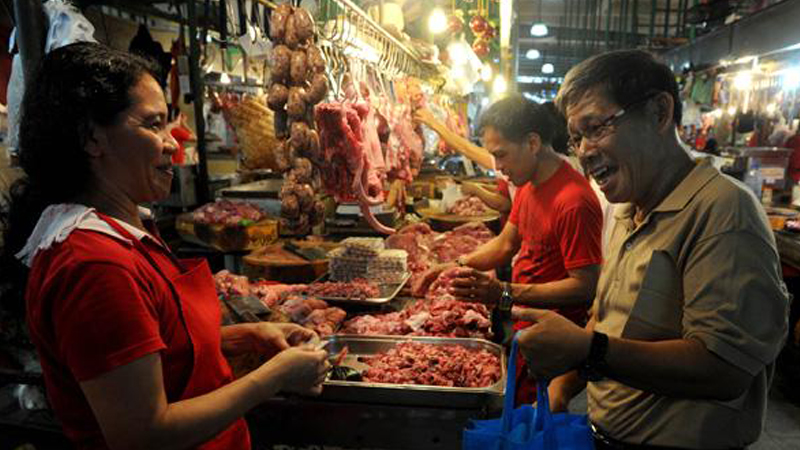ECONOMIC concerns top the Filipinos’ list of issues that should be dealt with immediately by the administration of President Duterte, who won the May 9 elections on a campaign anchored on fighting crime, drugs and corruption.
The top three concerns are inflation (68 percent), employment (56 percent) and propoor programs (55 percent), according to results of a nationwide Pulse Asia survey conducted on July 2-8.
Just a near majority of Filipinos (48 percent) would like the Duterte administration to immediately deal with criminality.
Rounding the top concerns are providing loans to small entrepreneurs and the self-employed (23 percent), preparing a program addressing the government’s debt problem (17 percent) and pursuing peace talks with different armed groups (17 percent).
A mere 7 percent of Filipinos say amending the 1987 Constitution is a priority.
Consumer prices increased 1.9 percent year-on-year in June, up from 1.6 percent in May. It was the highest inflation rate since May 2015. Average annual inflation from 2010 to 2015 was 3.4 percent, lower than the six-year average of the Arroyo administration.
Though the inflation rate is low as a whole, it does not mean prices are going down.
The price of “galunggong” (round scad), for example, was P82.96 a kilo in May 2010 but had gone up to P110.03 a kilo by May, about a fourth of the daily minimum wage. Inflation is a concern if incomes do not increase proportionally with the rise in prices.
Jobs
Creating lasting jobs and employment opportunities for more Filipinos remains a challenge for the government. The unemployment rate stood at 6.1 percent in April, down slightly from 6.4 percent last year.
Underemployment, meanwhile, increased from 17.8 percent to 18.4 percent.
About half of Filipinos expect the Duterte administration to prioritize the crafting of propoor programs that would provide free education, health and housing, according to the Pulse Asia survey.
Latest government data show more than a fourth (26.3 percent) of Filipinos are living in poverty, with some 3.1 million families reporting having experienced hunger in the first quarter of the year.
Access to quality health services for the poor remains to be among the biggest challenges in the health sector.
Amid the implementation of the K-12 program, thousands of students have been unable to enroll in the senior high school program due to poverty.
A housing backlog of 1.4 million units also remains to be addressed.
Debt problem
Continued lack of access to financing remains to be the biggest hurdle facing more than 940,000 micro, small and medium enterprises in the Philippines. They account for more than 99 percent of registered enterprises in the country and comprise 61.2 percent of the total employment.
During the campaign, Mr. Duterte noted that these small businesses were forced to turn to loan sharks because they found it difficult to borrow capital.
Although reforms of the Aquino administration helped the country get investment-grade credit ratings and improve the country’s fiscal health, a program that will continue to address the government’s debt problem remains to be a top priority among Filipinos.
Latest data from the Bureau of the Treasury put the government’s outstanding debt at P5.886 trillion in May, up from P5.884 trillion in April. For 2016, the government has allocated P419.3 billion or 14 percent of the P3.002-trillion national budget for debt servicing.
Of Mr. Duterte’s campaign promises, it was his anticrime platform that resonated the most with the people.
Last year, more than half a million crime incidents were reported by the Philippine National Police for the first six months alone.
The drug problem has festered, with the Philippine Drug Enforcement Agency saying that about a fourth of the country’s barangays (11,321 out of 42,036) were drug-affected as of December 2015.
In Metro Manila, nine out of 10 barangays are drug-affected. Nevertheless, the PNP has said the crime volume has been steadily declining since the start of the year—from 52,950 incidents in January to 46,060 in June.
The fall came amid a spike in drug-related deaths as the government stepped up its campaign against illegal drugs. An Inquirer tally put the total drug-related deaths at 339 from July 1 to July 23, with 240 killed in police operations.
Negotiating peace
Peace and progress go hand-in-hand in promoting development and securing the welfare of the people.
The search for lasting peace in Mindanao continues after the Aquino administration failed to pass the Bangsamoro Basic Law.
The new administration has said it will negotiate peace with the the communist-led National Democratic Front, the Moro Islamic Liberation Front and other Moro groups.
Charter change
Several attempts were made by previous administrations to amend the 1987 Constitution.
While Mr. Duterte’s campaign promises included a shift to a federal form of government to enhance the autonomy of local government units, changing the Constitution is not among the issues that Filipinos say should be prioritized by the new administration.TVJ
RELATED STORIES
Rice trade liberalization bad for PH farmers, food security
Banks’ profit seen to sustain robust growth


